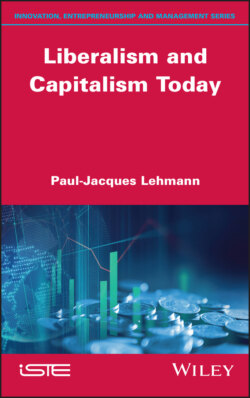Liberalism and Capitalism Today

Реклама. ООО «ЛитРес», ИНН: 7719571260.
Оглавление
Paul-Jacques Lehmann. Liberalism and Capitalism Today
Table of Contents
Guide
Pages
Liberalism and Capitalism Today
Introduction
PART 1. The Conditions in Which Liberalism and Capitalism Appeared
Introduction to Part 1
1. Political and Legal Conditions
1.1. Liberalism and democracy: new eldorados of political thought and political life
1.1.1. Liberalism, defender of the superiority of the individual, and its economic application, capitalism
1.1.2. The reduced role of the state and different positions in relation to monopolies
1.1.3. Democracy as a guarantee of freedom and equality
1.1.4. The economic consequences of democracy
1.2. The right of ownership as a necessary condition for savings and capital formation
1.2.1. Freedom as a condition of private property
1.2.2. Land ownership
1.2.3. Property rights and savings
1.3. The advent of the bourgeoisie
1.3.1. The hold of the military and the nobility in Antiquity
1.3.2. The emergence of the urban bourgeoisie: a Western phenomenon
1.3.3. When economic power…
1.3.4. … transforms into political power
1.4. The nascent authority of state bureaucracy
1.4.1. Legitimate coercion by the state
1.4.2. The evolution of the activities of state bureaucracy actors
1.4.3. Advantages and disadvantages of state bureaucracy
2. Economic and Sociological Conditions
2.1. Trade and industry: competitors of agriculture and the craft industry
2.1.1. The lesser role of agriculture
2.1.2. The growing role of trade…
2.1.3. … generated by free competition at national levels…
2.1.4. … and international levels
2.2. The dangers of industrialization
2.2.1. Industrialization and the destructiveness of the division of labor for humanity
2.2.2. The appearance of an industrial aristocracy
2.2.3. Corporate concentration
2.2.4. Growing pauperism
2.3. The decisive influence of the Protestant religion on economic rationalization
2.3.1. The Protestant Ethic and the Spirit of Capitalism
2.3.2. The sacredness of work and profit
2.3.3. The need for growth
2.3.4. Rationalization of the economy
2.4. The role of money and financial markets
2.4.1. The need for money
2.4.2. The first banks
2.4.3. The first financial markets
PART 2. The Evolution of Liberalism and Capitalism
Introduction to Part 2
3. The Birth of a New Capitalism in a New World: Financial Capitalism
3.1. The emergence and development of financial capitalism
3.1.1. Globalization
3.1.2. The information revolution
3.1.3. The financial revolution
3.2. Changes in corporate governance
3.2.1. Taking sustainable development5 into account…
3.2.2. … and pollution
3.3. New economic policies
3.3.1. The need to combat rising prices
3.3.2. Monetary policy to combat inflation
3.3.3. Discretionary versusautomatic economic policy
3.4. From the perfection of theoretical capitalism to the crises of real capitalism
3.4.1. Changes in the assumptions of pure and perfect competition
3.4.2. Questioning the uniqueness of prices
3.4.3. Expectations which are supposedly too perfect
3.5. Recurrent causes of the crises of capitalism
3.5.1. The beginnings of any financial crash: an innovation stemming from a need for financing
3.5.2. From speculation to collective psychosis
3.5.3. A monetary expansion
3.5.4. The bursting of the financial bubble
3.6. Some examples of crises of capitalism
3.6.1. The crises following the discovery of the New World
3.6.2. Crises due to the transportation revolution
3.6.3. The 1929 crisis
3.6.4. The 1987 crash
3.6.5. The crisis of the new economy in the year 2000
4. Towards 21st Century Capitalism
4.1. A responsible and proactive economic policy
4.1.1. A policy of growth
4.1.2. The search for price stability
4.1.3. Improving the functioning of markets through positive regulation…
4.1.4. … in order to ensure the ethics of capitalism…
4.1.5. … and respect for the freedom of the market
4.2. Finance that respects the principles of capitalism
4.2.1. Banking regulation in the form of minimum prudential ratios
4.2.2. Financial regulation
4.2.3. The need for transparency on unregulated markets
4.2.4. Regulation of the over-the-counter markets
4.3. Renewed corporate governance
4.3.1. Better controlled accounting standards
4.3.2. A different kind of business management
4.3.3. The necessity of training employees and citizens in general
Conclusion
References
Index. A, B, C
D, E, F
G, H, I
N, P
R, S
T, W
WILEY END USER LICENSE AGREEMENT
Отрывок из книги
Paul-Jacques Lehmann
.....
Liberty, equality, individual interest and responsibility are only obtained and implemented within a strictly appropriate legal framework with control guaranteed by the public authorities. In particular, these principles require that the right of ownership exist and be respected, here, too, materialized by the free signing of contracts. Indeed, the right of private property is not only the precondition of capitalism, but also its cornerstone.
Thus, Friedrich Hayek goes so far as to say that where there is no property, there is no justice. He considers that the right to property must be established so that all members of a community can own property, freely dispose of it and be protected against its usurpation. In this regard, it is worth recalling that in the Declaration of the Rights of Man and of the Citizen, private property is recognized as an inalienable right that protects the individual from their neighbors as well as from political power. All contracts must be governed by the regime of freedom. Thus, the first example of private property, land ownership, must be extended to all contracts in which property is likely to encourage savings.
.....